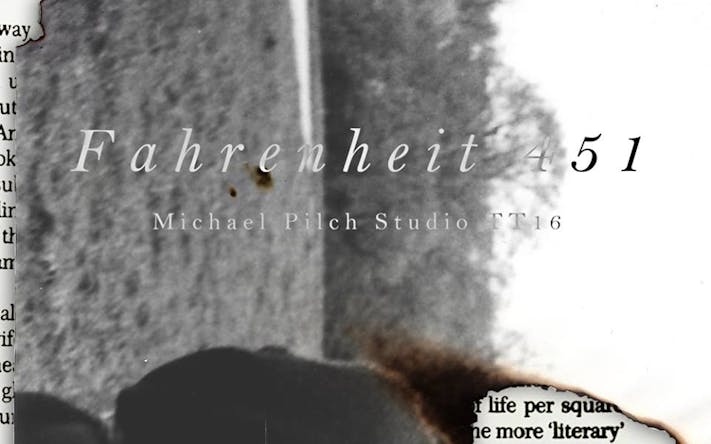Drame Fatale's mounting of Ray Bradbury's Fahrenheit 451 (first a novel in 1953; then adapted for the stage by the author in the late '70s) has a certain topicality given the current debate in free speech-circles over the 'No Platform' trend in British universities, endorsed in part by the NUS.
For those unfamiliar with the material, Fahrenheit 451 refers to the temperature required for the printed page to be consumed. In Bradbury's world, firemen start fires rather than extinguish them. Instead of one day eradicating class difference through civil discourse (my neighbour in the studio, Zachary Leather of Balliol College, kindly told me that the student politics of the moment revolves around hounding Chris Patten about admissions and minorities), the state seeks by means of blitz squads and tracker dogs to eradicate the last traces of great works of literature and thought. The bread and circuses of Ancient Rome as popular panacea for getting through the day here has dwindled yet further into the anaesthesia of pill-popping.
Bradbury's drama places the focus squarely on its actors and the text. Herein lies its one weakness, a tendency for rhetoric - and occasionally repetitive rhetoric - to stand in for dialogue that's fully integrated into character and action. This may be one of those cases where the turning of the book into a play may have been more profitably done by an objective third-party, a little readier to wield the scissors, than by the novel's author. That said, there's plenty of striking, situational dialogue for the audience to get its teeth into.
The Michael Pilch Studio is a tight, black box of a space that's always going to give a headache or ten to the production that aspires to putting on ambitious, imaginative drama. But make no mistake: this is just what Drame Fatale has done. It has employed a raised platform measuring 6.5m x 2.6m plus a tiny, related area filled with cabin trunks, books and detritus. This space is then flooded with light, alternately pounded and massaged with sound effects (outstanding work from respectively Jen Hurd and Tegan Eldrige) employed as a home, a street, a wilderness beyond the city (by excellent designer Ksenia Kulakova) where enlightened folk are preserving great texts by memory against the day when the book-burners have dwindled and fallen on a pyre of their own invention. Not least, in a terrifying moment, the dais becomes a killing-ground where a programmed Hound of the Baskervilles roams and pounces. Pretty impressive stuff from a professional company; from a student drama group - well, one reaches for superlatives.
Chris Page is suitably morose, though possibly a little too low-key at times, as the disillusioned fireman Montag whose awakening is his death-warrant. He and his wife, Mildred (a suitably jerky, ultimately traitorous Sophia Rolt) inhabit a place crawling with pain and fear. There was not a single weak link in the casting. I liked the fire chief''s enforcers, Hugo McPherson and Archie Foster in their Doc Martens. Christian Amos as Professor Faber, bloody but unbowed, was unhurried but intense; a striking combination. But the standout has to be Ali Porteous' Captain Beatty, a swarthy figure in black with tan shoes. He dominates the stage, whether barking out orders, smarmily cajoling and entrapping Montag, declaiming his cod-philosophy, or indulging in mock self-pity. I didn't know whether to admire more his fluent movement or the range of his voice.
Director Charlotte Vickers told me afterwards she's been hard at it since the beginning of March, culminating in 4 or 5 weeks of rehearsals. She kindly shared with me the genesis of the project and the process of turning her artistic vision into reality. Instead of settling for something small-scale and safe, she's taken her cast and crew - and audience - out of their comfort zone and gone for something high, wide and handsome. This is what student drama should be about.
Dystopia awaits you on Jowett Walk. Don't miss it!




